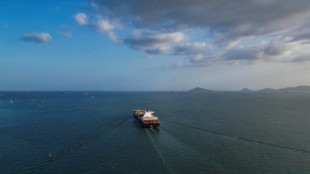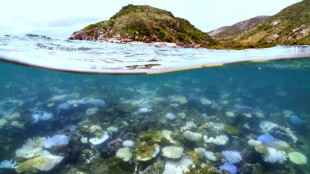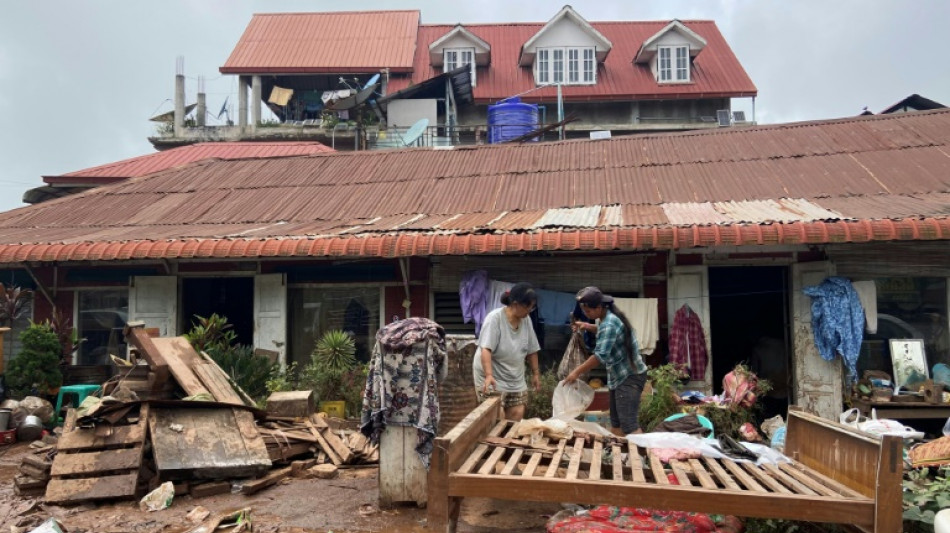
-
 Texans warily eye impact of Trump's tariffs on their beloved trucks
Texans warily eye impact of Trump's tariffs on their beloved trucks
-
Equities savaged as China retaliation to Trump tariffs fans trade war
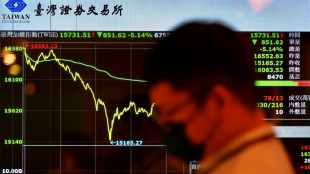
-
 Sara Duterte back in Philippines after month with detained father
Sara Duterte back in Philippines after month with detained father
-
Netanyahu and Trump to talk tariffs, Iran and Gaza

-
 Max power, Tsunoda's mixed debut, quick Kimi: Japan GP talking points
Max power, Tsunoda's mixed debut, quick Kimi: Japan GP talking points
-
Luis Enrique's revolution leaves PSG stronger without the superstars

-
 Messi on target but Miami held by lowly Toronto
Messi on target but Miami held by lowly Toronto
-
Inter's bold treble bid bumps up against past glory at Bayern Munich

-
 Sagstrom digs deep to win LPGA Match Play
Sagstrom digs deep to win LPGA Match Play
-
The music industry is battling AI -- with limited success

-
 New app hopes to empower artists against AI
New app hopes to empower artists against AI
-
Haiti jazz festival is rare respite for violence-racked capital

-
 Johnson satisfied after opening Grand Slam series event
Johnson satisfied after opening Grand Slam series event
-
China would have agreed TikTok deal if not for US tariffs: Trump

-
 Market panic mounts as world scrambles to temper Trump tariffs
Market panic mounts as world scrambles to temper Trump tariffs
-
Harman keeps calm in the winds to clinch Texas Open

-
 Doncic scores 30 as Lakers rout Thunder
Doncic scores 30 as Lakers rout Thunder
-
Qualifier Brooksby stuns Tiafoe to win first ATP title

-
 McLaughlin-Levrone seals Grand Slam jackpot with 400m victory
McLaughlin-Levrone seals Grand Slam jackpot with 400m victory
-
Juventus miss out on Serie A's top four with Roma draw

-
 Marseille, Strasbourg win in Ligue 1 to close in on Champions League
Marseille, Strasbourg win in Ligue 1 to close in on Champions League
-
Pegula wins WTA Charleston after Kenin collapse

-
 Second US child dies of measles, almost 650 ill: officials
Second US child dies of measles, almost 650 ill: officials
-
Thousands attend funeral of legendary Malian musician Amadou

-
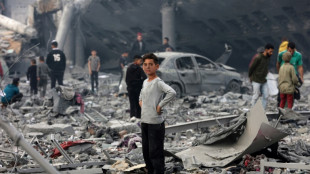 Gaza rescuers say Israeli strikes kill 44
Gaza rescuers say Israeli strikes kill 44
-
Alcaraz admits pressure to take Sinner's number one ranking 'killed' him

-
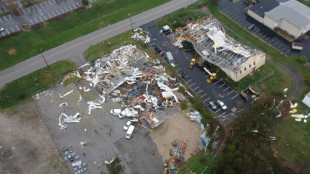 US storms, 'devastating' flooding death toll climbs to 17
US storms, 'devastating' flooding death toll climbs to 17
-
Ovechkin achieves the 'impossible'

-
 Comeback man Siraj's 4-17 helps Gujarat to hat-trick of IPL wins
Comeback man Siraj's 4-17 helps Gujarat to hat-trick of IPL wins
-
Ovechkin scores 895th goal to clinch all-time NHL record

-
 No 'killer instinct' as Man Utd, Man City play out derby stalemate
No 'killer instinct' as Man Utd, Man City play out derby stalemate
-
Siraj's 4-17 helps Gujarat to hat-trick of IPL wins

-
 Man City held by Man Utd in derby stalemate
Man City held by Man Utd in derby stalemate
-
'Minecraft Movie' strikes gold to dominate N.America box office

-
 World scrambles to temper Trump tariffs as market fears mount
World scrambles to temper Trump tariffs as market fears mount
-
Strasbourg close in on Champions League with Ligue 1 win at Reims

-
 Toulouse overpower Sale to reach rugby Champions Cup last eight
Toulouse overpower Sale to reach rugby Champions Cup last eight
-
Slot shocked by sloppy Liverpool errors in Fulham defeat

-
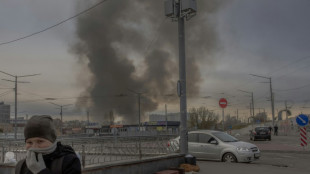 Zelensky slams US lack of response to Putin truce rejection
Zelensky slams US lack of response to Putin truce rejection
-
Juric urges Southampton to learn from record-setting relegation

-
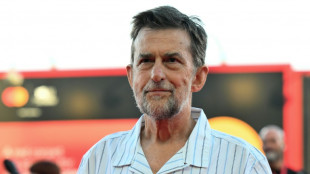 Italian director Moretti leaves hospital after heart attack
Italian director Moretti leaves hospital after heart attack
-
Chelsea's 'unfair' schedule to blame for Palmer axe: Maresca

-
 Barrios grabs Atletico late Liga win at Sevilla
Barrios grabs Atletico late Liga win at Sevilla
-
Le Pen slams 'witch hunt', vows not to give up at Paris rally

-
 Liverpool's rare loss delays title march, Southampton relegated
Liverpool's rare loss delays title march, Southampton relegated
-
World scrambles to temper Trump tariffs: White House

-
 Southampton relegated from Premier League in record time
Southampton relegated from Premier League in record time
-
Fulham end Liverpool unbeaten league run to delay title party

-
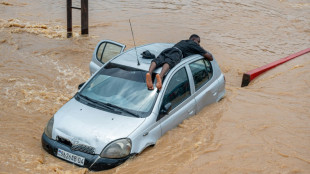 Torrential rains kill dozens in DR Congo capital
Torrential rains kill dozens in DR Congo capital
-
Pogacar wins Van der Poel duel at cycling's Tour of Flanders

| BCC | 0.85% | 95.44 | $ | |
| SCS | -0.56% | 10.68 | $ | |
| NGG | -5.25% | 65.93 | $ | |
| CMSC | 0.13% | 22.29 | $ | |
| AZN | -7.98% | 68.46 | $ | |
| GSK | -6.79% | 36.53 | $ | |
| BTI | -5.17% | 39.86 | $ | |
| RIO | -6.88% | 54.67 | $ | |
| RBGPF | 100% | 69.02 | $ | |
| JRI | -7.19% | 11.96 | $ | |
| BCE | 0.22% | 22.71 | $ | |
| BP | -10.43% | 28.38 | $ | |
| RELX | -6.81% | 48.16 | $ | |
| RYCEF | -18.79% | 8.25 | $ | |
| VOD | -10.24% | 8.5 | $ | |
| CMSD | 0.7% | 22.83 | $ |

Supercharged storms: how climate change amplifies cyclones
From Hurricane Helene to Typhoon Yagi, powerful storms are battering the globe, and scientists warn that a warming planet is amplifying their destructive force to unprecedented levels.
Here's what the latest research reveals about how climate change is supercharging tropical cyclones -- the generic term for both weather phenomenon.
- Packing more punch -
First, the basics: warmer ocean surfaces release more water vapor, providing additional energy for storms, which intensifies their winds. A warming atmosphere also allows them to hold more water, boosting heavy rainfall.
"On average, the destructive potential of hurricanes has increased about 40 percent due to the 1 degrees Celsius (roughly 2 degrees Fahrenheit) warming that has already taken place," Michael Mann, a climatologist at University of Pennsylvania, told AFP.
In a recent paper in the Proceedings of the National Academy of Sciences (PNAS), Mann added his voice to calls for the Saffir-Simpson scale to be expanded to include a "new class of monster storms" -- Category 6, where sustained winds exceed 192 miles per hour (308 kph).
According to experts, climate change set the stage for Helene, which peaked as a Category 4 hurricane.
"The oceanic heat content was at a record level, providing plenty of fuel and potential for a storm like this to gain strength and become a large and very damaging storm," David Zierden, Florida's state climatologist, told AFP.
- Rapid intensification -
"Rapid intensification," defined as a hurricane speeding up by 30 knots within a 24-hour period, is also becoming more common.
"If intensification happens very close to the coast in the lead up to landfall, it can have a huge effect, which you saw last week in the case of Helene," Karthik Balaguru, a climate scientist at the Department of Energy’s Pacific Northwest National Laboratory, told AFP.
Balaguru was the lead author on a paper this year in journal Earth's Future that used decades of satellite data to show "a robust increase in the rates at which storms intensified close to the coast, and this is across the world."
The explanation is two-fold.
Warming climate patterns are reducing wind shear -- changes in wind speed and direction with height -- along both the Atlantic Coast of North America and the Pacific Coast of Asia.
"When you have strong wind shear, it tends to tear apart the core of the storm," explained Balaguru.
Climate change is also driving higher humidity along coastlines compared to the open ocean.
This is likely due to a thermal gradient created as land heats faster than water, causing changes in pressure and wind circulation that push moisture into the mid-troposphere where storms can access it. More data is needed to confirm this hypothesis.
Additionally, rising sea levels -- about a foot over the past century -- mean cyclones are now operating from a higher baseline, amplifying storm surges, said Zierden.
- How often? -
While the impact of climate change on how often cyclones happen is still an active area of research, studies suggest it can either increase or decrease frequency, depending on the region.
Particle pollution generated by industry, vehicles, and the energy sector blocks sunlight, partially offsetting the warming effects of greenhouse gases.
In a Science Advances paper, Hiroyuki Murakami, a physical scientist at the National Oceanic and Atmospheric Administration, found that particle emissions from the US and Europe peaked around 1980, and their decline leading to a rise in hurricane frequency in the Atlantic.
Conversely, in Asia, high pollution levels in China and India may be suppressing more frequent storm in the western Pacific, Murakami told AFP.
Another study he led found that human activity has increased tropical cyclone activity off Japan’s coast, raising the risk of rare precipitation events in the country's west through frontal rainbands—even when the storms themselves don’t make landfall.
This year's North Atlantic hurricane season was initially projected to be highly active. However, various meteorological factors created a lull from August through September, according to Zierden and Murakami.
Now, though "we've seen a dramatic ramp-up over the past week," said Mann. With hurricane season running until November 30, we're not in the clear yet, he stressed.
O.M.Souza--AMWN
